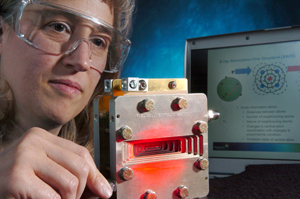 |
Transportation Technology R&D Center |  |
Hydrogen and Fuel Cells Research & Development
Fuel Cells: Clean, Efficient Power SourcesFuel cells have been identified as clean, efficient power sources for automotive, stationary and portable power applications by the U.S. Department of Energy (DOE) Fuel Cell Technologies Program. Fuel cells are being tested and their use demonstrated in light-duty vehicles (passenger cars), heavy-duty vehicles (buses), industrial/commercial applications (combined heat and power for hotels, fork-lift trucks, airport ground vehicles, power for cellular telephone towers) and consumer applications (residential combined heat and power, cellular telephones, lap-top computers). While these fuel cell-powered devices and systems have reached a certain state of technical maturity, significant additional development is still needed in fuel cell materials and manufacturing processes, and in the technologies for hydrogen production and automotive hydrogen storage, to make these systems cost effective, durable and commercially viable in the marketplace. Argonne National Laboratory is an active participant in DOE’s hydrogen and fuel cell research program. The Laboratory is conducting research in hydrogen production and storage, fuel cell materials and systems, and in fuel cell testing and evaluation Hydrogen Production and Storage Research for Automotive ApplicationsFuel cells for automotive applications will need a reliable, inexpensive source of hydrogen. Hydrogen storage materials and technologies will need to provide enough capability and capacity to enable the same driving range between refueling as a conventional gasoline vehicle. Argonne’s research efforts focus on:
Fuel Cell Research and DevelopmentResearch in fuel cell materials and systems is needed to reduce their cost and to increase their durability. In addition, fuel cell systems must be designed and configured to meet the power, energy and efficiency requirements of the specific applications’ duty cycle, whether that be an automotive driving cycle or a residential/commercial heat and power demand schedule. Argonne’s research efforts focus on:
Fuel Cell Testing: Fuel Cell Test FacilityAs fuel cell technologies evolve, there is a great need for independent, standardized testing and evaluation capabilities. Argonne’s Fuel Cell Test Facility offers the equipment and expertise to conduct unbiased analyses of fuel cells for stationary and transportation applications. With the capability to test specific component technologies on up through fully integrated fuel cell systems that incorporate their own fuel processing and air supply subsystems, the Fuel Cell Test Facility is a tremendous resource for fuel cell developers, fuel cell users, original equipment manufacturers and government and private agencies. Collaborative WorkArgonne regularly applies its expertise to projects sponsored by non-DOE organizations. These include materials, processes and systems development for, or in collaboration with, public and private organizations. In addition, Argonne works collaboratively with universities on technical research, and with leading manufacturers to develop new technologies and bring viable technologies to market. For more information on technical research opportunities, contact Romesh Kumar. For more information on technology transfer, contact Jeff Chamberlain. Student OpportunitiesMany opportunities exist for students at both the undergraduate and graduate levels to contribute to hydrogen and fuel cell research efforts. University faculty and faculty/student teams can also participate in ongoing projects. For more information on student and faculty internships, visit the Division of Educational Programs (DEP) at www.dep.anl.gov. FundingThis work is funded by the Fuel Cell Technologies Program of the DOE Office of Energy Efficiency and Renewable Energy. More
|
|
|||||
| UChicago Argonne LLC | U.S. DOE Energy Efficiency and Renewable Energy |
| Privacy & Security Notice | Contact Us | Site Map |
